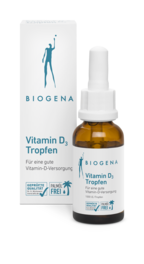A strong immune system is the basis for your well-being – and vitamin D plays a central role in this. In this blog article, you will learn why your body needs this vital substance, how it produces it and what you should bear in mind.
Benefits of vitamin D for the immune system and for immunity
Pathogens, pollutants or negative cell changes – your immune system has to fight many battles every day. Not only with environmental influences, but also with harmful changes inside your body. And it wants to do something about it as quickly as possible. To do this, various organs, cell types and proteins work closely together.
If your defences are working perfectly, you won't even notice this busy activity. However, if your immune system is weakened or encounters particularly aggressive opponents, you will get sick.
Your immune system is activated by a range of foreign substances, known as antigens. These trigger a variety of cellular processes. When your body comes into contact with a pathogen for the first time, it stores information about this opponent so that it can react more quickly if it encounters it again later. There is therefore both an innate immune system, which is already present at birth, and an acquired immune system. The latter develops over the course of your life.
Vitamin D plays a key role in this process. It supports both the innate and acquired immune systems by promoting immune cells that can kill pathogens, inhibit inflammation and fight infections. However, it not only helps you in an emergency, but also provides preventive protection.
What your body needs to produce vitamin D
How does your body obtain vitamin D? First, the good news: it is able to produce this important substance itself with the help of ultraviolet radiation from the sun via the skin. Sunbathing is therefore beneficial. But there is a catch: obtaining vitamin D purely from the sun is not sufficient for most people. This is also revealed by the ‘Good Health Study’ by BIOGENA. The reason: modern lifestyles mean we spend less time outdoors.
The expectation that the body will get enough vitamin D from the sun is therefore incorrect in most cases. You can also obtain this important nutrient from food. But here too, experts have long agreed that it is virtually impossible to meet your needs purely through your normal diet. The only option for providing your body with an effective and sufficient supply of vitamin D is therefore to specifically rely on dietary supplements.
Why vitamin D is often in short supply during winter
When the days are shorter and the sun is less visible, vitamin D, an important health factor, often takes a back seat. This is because, especially in the dark season – roughly from mid-October to mid-March – the sun's rays are too weak in our part of the world to stimulate significant production in the body. So it's no wonder that many people slip into deficiency during this time – often without noticing it immediately.
A vitamin D deficiency can manifest itself in many different ways: you may feel like you have a cold more often, be irritable, restless or suffer from hair loss. Muscle weakness, bone pain or an increased risk of high blood pressure and diabetes can also be signs.
The BIOGENA Good Health Study shows just how widespread this issue is: a full 91% of participants were found to have suboptimal vitamin D levels in blood tests conducted in the spring, with almost half of them even falling into the severe deficiency range. (Wäger et al. 2022, unpublished)
What's more, low vitamin D levels do have consequences. Studies show that insufficient levels in autumn and winter significantly increase susceptibility to upper respiratory tract infections. Sick days taken by employees are also linked to poor or suboptimal vitamin D levels. (Sinnißbichler & Viebahn 2011, unpublished)
To get through the cold and flu season in good health, you should therefore include a high-quality vitamin D supplement in your daily routine, at the latest during the low-light season.
Supplementing vitamin D: Is there a specific dosage for the immune system?
According to the German Nutrition Society, the recommended daily intake for children, adolescents and adults is 20 µg or 800 IU of vitamin D – this also applies to supporting the immune system. However, as many people have long been deficient, higher doses of vitamin D also have health benefits – but these should ideally be based on blood values. The safe maximum daily intake is 100 µg or 4000 IU.
Conclusion: Does vitamin D help the immune system?
Sometimes it's the invisible things that have the biggest impact on your well-being – like vitamin D. It works quietly, supporting your immune system on several levels, and becomes scarce just when you need it most. So instead of just hoping for sunshine, it's worth taking a conscious look at your intake. After all, giving your body exactly what it needs creates the best foundation for strong defences – all year round.
Frequently asked questions about vitamin D for the immune system
Yes, vitamin D can strengthen the immune system. It plays an important role in regulating the immune response and supports the activity of immune cells, which are essential for defending against pathogens. Sufficient vitamin D levels can also help to reduce the risk of infections, colds or flu.
Yes, there is evidence that vitamin D can prevent colds. A good supply of vitamin D is generally important for a functioning immune system.
Yes, vitamin D can help with colds by strengthening the immune system and reducing susceptibility to respiratory infections.
Vitamin D supports the normal functioning of the immune system – in a completely natural way. Especially during the dark months of the year, a good supply of vitamin D can help keep your immune system in balance.
Sources:
Aranow C. Vitamin D and the immune system. J Investig Med. 2011 Aug;59(6):881-6. doi: 10.2310/JIM.0b013e31821b8755. PMID: 21527855; PMCID: PMC3166406. https://pubmed.ncbi.nlm.nih.gov/21527855/
Sîrbe C, Rednic S, Grama A, Pop TL. An Update on the Effects of Vitamin D on the Immune System and Autoimmune Diseases. Int J Mol Sci. 2022 Aug 29;23(17):9784. doi: 10.3390/ijms23179784. PMID: 36077185; PMCID: PMC9456003. https://pubmed.ncbi.nlm.nih.gov/36077185/
Carlberg C, Raczyk M, Zawrotna N. Vitamin D: A master example of nutrigenomics. Redox Biol. 2023 Jun;62:102695. doi: 10.1016/j.redox.2023.102695. Epub 2023 Apr 5. PMID: 37043983; PMCID: PMC10119805. https://pubmed.ncbi.nlm.nih.gov/37043983/
Mora JR, Iwata M, von Andrian UH. Vitamin effects on the immune system: vitamins A and D take centre stage. Nat Rev Immunol. 2008 Sep;8(9):685-98. doi: 10.1038/nri2378. PMID: 19172691; PMCID: PMC2906676. https://pubmed.ncbi.nlm.nih.gov/19172691/
Martens PJ, Gysemans C, Verstuyf A, Mathieu AC. Vitamin D's Effect on Immune Function. Nutrients. 2020 Apr 28;12(5):1248. doi: 10.3390/nu12051248. PMID: 32353972; PMCID: PMC7281985. https://pubmed.ncbi.nlm.nih.gov/32353972/
Charoenngam N, Holick MF. Immunologic Effects of Vitamin D on Human Health and Disease. Nutrients. 2020 Jul 15;12(7):2097. doi: 10.3390/nu12072097. PMID: 32679784; PMCID: PMC7400911. https://pubmed.ncbi.nlm.nih.gov/32679784/










